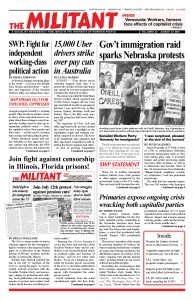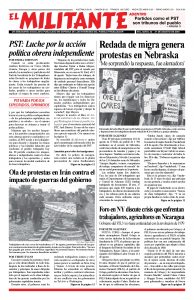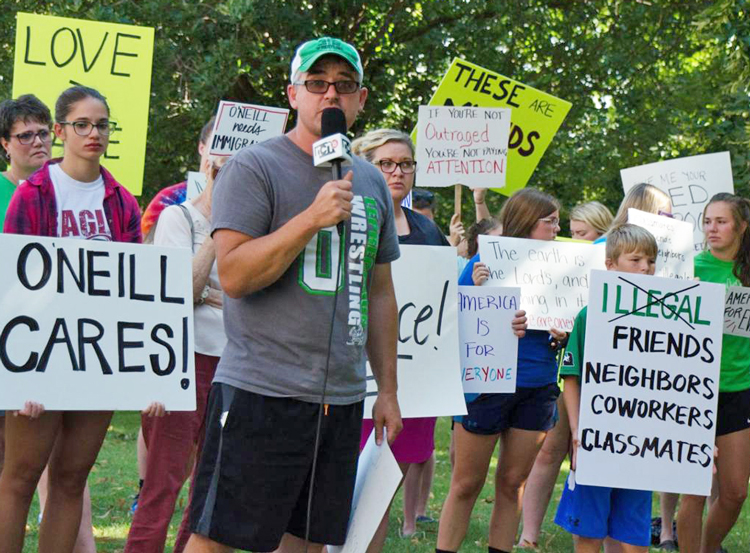Some 80 people in O’Neill, a town of 3,700 in northeastern Nebraska, protested immigration raids as they were taking place Aug. 8 at nearby tomato and potato processing plants and some other locations, as well as in Minnesota and Nevada. Most of the 133 arrested were from Nebraska. “Illegal friends, neighbors, coworkers, classmates,” read one prominent protest sign.
The raids had two separate targets. The over 100 workers who Immigration and Customs Enforcement says were working without proper papers. The other target was 17 people ICE claims brought the workers in, got them fake IDs, and stole part of their wages each week. They face felony conspiracy charges.
“I was teaching swimming when I heard the news,” Kendra Vanderbeek, an English teacher, said by phone Aug. 8. She headed right over to O’Neill High School to talk with Bryan Corkle, a science teacher and wrestling coach. He told her, “We’ve got to get something together.”
“So we called people and put it on Facebook,” Vanderbeek said. “And with just an hour and a half notice, the number of people who came out was encouraging.” There were also protests over the next several days in Grand Island, Nebraska, where workers were taken after their arrest, and in Norfolk and other nearby towns.
This is the first time, Vanderbeek, 25, said, she had ever joined a protest, much less helped organize one.
Vanderbeek’s father is an electrician and her mother is a waitress. “We’re blue collar, working class,” she said. “And even in my own family not everyone agrees with me. Quite a few people say, ‘How can I help the kids, but I don’t feel bad for the parents because they made the decision to break the law.’”
“I try to take the humanitarian side of it,” Vanderbeek said. “I say, ‘You’re a parent, just imagine what you would feel like in that exact situation.’”
More than 85 percent of the vote in Holt County, where O’Neill is located, went for Donald Trump in the 2016 presidential election. More than 90 percent of residents are Caucasian. The town was founded by Irish immigrants in 1882.
“I was surprised at the support we have from community members,” Vanderbeek said.
“These people have been working and living here for years and they’ve become part of the community and part of the family,” she said. “That’s why views are changing.”
Factory raids unpopular
Factory and other workplace raids had been a central tool that the U.S. government used for decades to instill fear in immigrant workers to keep them from joining unions and demanding better wages and conditions.
But the raids have become more and more unpopular, especially after millions of immigrant workers took to the streets in 2006 to protest a bill before Congress to make it a felony to be in the United States without a visa. The bill was defeated, and the workers without papers won growing support and respect from U.S.-born workers.
Native-born workers increasingly hid their fellow workers and protested the raids. Deciding the political cost was too high, the U.S. rulers ended the raids by mid-2008 and shifted to other methods, such as E-Verify and immigration “audits” to manage the flow of cheap labor the bosses desperately need.
But the administration of Donald Trump has begun to carry out workplace raids, including in Tennessee, Ohio and Iowa over the past several months. Many have been met with protests.
ICE used as many as 400 federal, state and local cops in the Aug. 8 tri-state raids, led by the agency’s Homeland Security Investigations police and backed by local authorities.
Area workers debate raid
Gerardo Pena, a forklift operator at Elkhorn River farms, was there when ICE surrounded the plant. “I should have run inside and said, ‘Run guys, because ICE is here,’ but I didn’t have any chance,” he told KETV News.
Kevin Stevenson, a butcher, had a different view. The raid “was probably long overdue,” he told the TV station. “I feel bad for them in a way, but hey, they’re here illegally.”
Don Tejral, who used to work at a meatpacking plant in Grand Island, told the Omaha World Herald, “Most of these people are hardworking. They just want to better their lives.” He said there should be a way for them to be able to work legally.
Local churches have helped the families of workers detained in the raid. Donations of food, toys and money have poured in from around the region.
At an Aug. 10 press conference organized by wrestling coach Corkle, Carmen, one of the workers who was detained in the raids and then released pending a court hearing, thanked all those who came out to support them. “It made us feel that we are not alone,” she said.
“We didn’t come here to take bread out of anyone’s mouth,” she said. “We just came to work with dignity for our families.”


